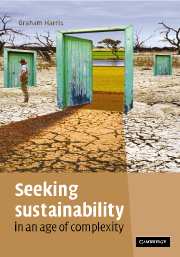Book contents
- Frontmatter
- Contents
- Acknowledgements
- 1 Preamble: the world we are in
- 2 Complexity and complex systems
- 3 New science, new tools, new challenges
- 4 The complexity of ecology
- 5 The generation of complexity
- 6 Micro-interactions and macro-constraints
- 7 A sense of place
- 8 Created landscapes and our changing sense of place
- 9 Catchment form and function
- 10 Catchment loads: ecosystem impacts
- 11 Change detection, monitoring and prediction
- 12 Evidence, uncertainty and risk
- 13 Modified landscapes: biodiversity
- 14 Function in fragmented landscapes
- 15 Environmental flows
- 16 Evidence for global change
- 17 Values and beliefs
- 18 Managing environmental, social and economic systems
- 19 Linking multiple capitals in a changing world
- 20 Community, capacity, collaboration and innovation
- 21 A new environmental paradigm
- 22 Emergent problems and emerging solutions: developing an ‘ecolophysics’?
- 23 Avoiding collapse
- Index
3 - New science, new tools, new challenges
Published online by Cambridge University Press: 21 March 2011
- Frontmatter
- Contents
- Acknowledgements
- 1 Preamble: the world we are in
- 2 Complexity and complex systems
- 3 New science, new tools, new challenges
- 4 The complexity of ecology
- 5 The generation of complexity
- 6 Micro-interactions and macro-constraints
- 7 A sense of place
- 8 Created landscapes and our changing sense of place
- 9 Catchment form and function
- 10 Catchment loads: ecosystem impacts
- 11 Change detection, monitoring and prediction
- 12 Evidence, uncertainty and risk
- 13 Modified landscapes: biodiversity
- 14 Function in fragmented landscapes
- 15 Environmental flows
- 16 Evidence for global change
- 17 Values and beliefs
- 18 Managing environmental, social and economic systems
- 19 Linking multiple capitals in a changing world
- 20 Community, capacity, collaboration and innovation
- 21 A new environmental paradigm
- 22 Emergent problems and emerging solutions: developing an ‘ecolophysics’?
- 23 Avoiding collapse
- Index
Summary
The implications of complexity for science and socio-economics; personal and institutional challenges
Viewing the world as a CAS puts an emphasis on the contingent history of the present. There are deep historical roots to all present enterprises and institutions. The enterprise of science is no different. It has a long history, which began in the sixteenth century with a change in philosophy from an Aristotelian view, seeking the underlying essences of things, towards a more practical way of knowing. Concepts of nature have a similarly long history, being based around concepts of balance, unity, equilibrium and human dominion. Science is one of the cornerstones of the modern, humanist enterprise. So science is inextricably connected to an instrumentalist ethical view and has developed to its fullest extent in the context of the culture and religion of the West. In the modern era science has developed what Salthe would call a Baconian, Cartesian, Newtonian, Darwinian and Comptean bias (which Salthe abbreviates as BDNDC from the first initials of Bacon, Descartes, Newton, Darwin and Compte) – being essentially realist, materialist and mechanistic, also value-free and logical – the perfect hand-maiden to the industrial revolution.
As opposed to a science of balance and equilibrium, a new science of complexity and resilience sees the world through new eyes. Instead of concentrating on linear responses to change around the equilibrium, on central tendencies, and on the average properties of data, the new science focuses instead on nonlinearities, on dynamic interactions, on contexts, and on network structures and the emergent properties of the interactions of agents.
- Type
- Chapter
- Information
- Seeking Sustainability in an Age of Complexity , pp. 28 - 38Publisher: Cambridge University PressPrint publication year: 2007



